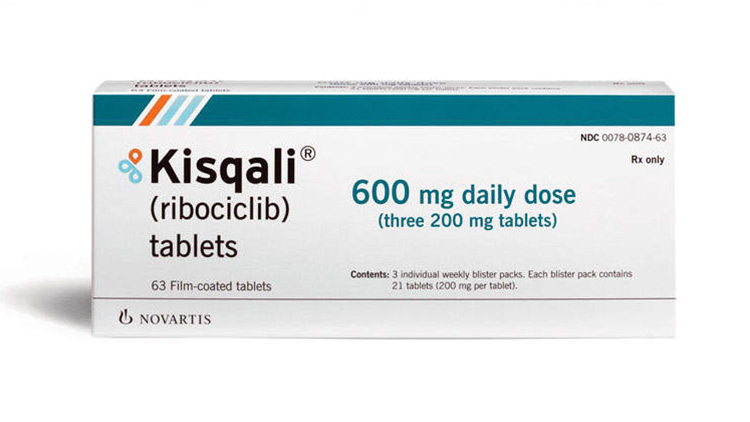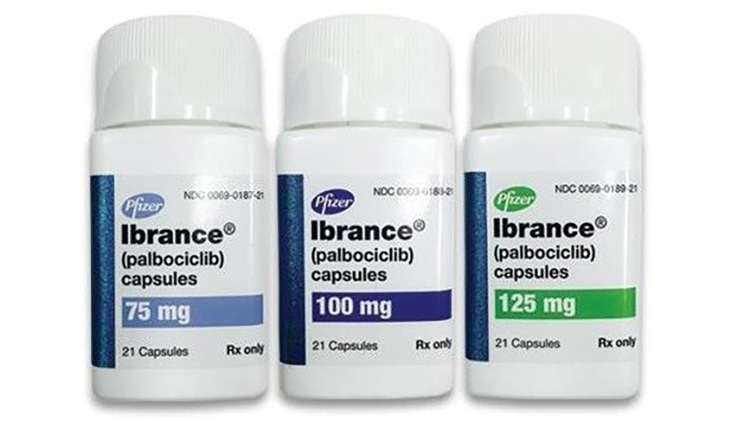Kisqali (ribociclib) vs Ibrance (palbociclib)
Kisqali (ribociclib) vs Ibrance (palbociclib)
Kisqali (ribociclib) and Ibrance (palbociclib) are both oral medications used to treat HR-positive, HER2-negative advanced or metastatic breast cancer in combination with an aromatase inhibitor or fulvestrant. While both drugs are CDK4/6 inhibitors and work by interfering with the proliferation of cancer cells, there may be slight differences in their side effect profiles and dosing schedules that could influence a physician's choice for a particular patient. It is important for patients to discuss with their oncologist their specific medical history, potential drug interactions, and lifestyle considerations to determine which medication is more suitable for their individual treatment plan.
Difference between Kisqali and Ibrance
| Metric | Kisqali (ribociclib) | Ibrance (palbociclib) |
|---|---|---|
| Generic name | Ribociclib | Palbociclib |
| Indications | HR-positive, HER2-negative advanced or metastatic breast cancer | HR-positive, HER2-negative advanced or metastatic breast cancer |
| Mechanism of action | CDK4/6 inhibitor | CDK4/6 inhibitor |
| Brand names | Kisqali | Ibrance |
| Administrative route | Oral | Oral |
| Side effects | Neutropenia, nausea, infections, fatigue, diarrhea | Neutropenia, leukopenia, infections, fatigue, nausea |
| Contraindications | Hypersensitivity to ribociclib or any of its components | Hypersensitivity to palbociclib or any of its components |
| Drug class | CDK4/6 inhibitor | CDK4/6 inhibitor |
| Manufacturer | Novartis | Pfizer |
Efficacy
Kisqali (Ribociclib) Efficacy in Breast Cancer
Kisqali (ribociclib) is a targeted therapy drug used for the treatment of certain types of breast cancer. Specifically, it is indicated for the treatment of hormone receptor-positive (HR+), human epidermal growth factor receptor 2-negative (HER2-) advanced or metastatic breast cancer. Ribociclib is a cyclin-dependent kinase inhibitor (CDK4/6 inhibitor) that works by interfering with the proliferation of cancer cells. Clinical trials have demonstrated that when combined with an aromatase inhibitor or fulvestrant, ribociclib significantly improves progression-free survival (PFS) compared to the hormonal therapy alone. This improvement in PFS indicates that ribociclib is effective in delaying the progression of HR+/HER2- advanced breast cancer.
Ibrance (Palbociclib) Efficacy in Breast Cancer
Ibrance (palbociclib) is another CDK4/6 inhibitor with a similar indication to ribociclib. It is approved for the treatment of HR+, HER2- advanced or metastatic breast cancer as well. Palbociclib has shown efficacy in extending PFS when used in combination with letrozole in postmenopausal women as initial endocrine-based therapy, as well as in combination with fulvestrant in women who have received prior endocrine therapy. The improvement in PFS demonstrates that palbociclib effectively slows down the growth and spread of breast cancer cells in the affected population.
Comparison of Kisqali and Ibrance Efficacy
Both Kisqali and Ibrance have shown to be effective in the treatment of HR+, HER2- advanced or metastatic breast cancer, particularly in combination with other hormonal therapies. While direct head-to-head comparisons of ribociclib and palbociclib in clinical trials are limited, both drugs have individually shown a significant increase in PFS in their respective trials. The choice between Kisqali and Ibrance may depend on various factors, including patient characteristics, side effect profiles, dosing schedules, and the specific combination of therapies used.
Considerations for Treatment with Kisqali and Ibrance
When considering treatment with Kisqali or Ibrance, healthcare providers evaluate the overall health of the patient, the specific characteristics of the breast cancer, and previous treatments the patient may have undergone. Both medications are generally well-tolerated, but they can have side effects that need to be managed. It is important for patients to be closely monitored by their healthcare team during treatment with CDK4/6 inhibitors. The efficacy of these drugs in improving PFS has made them an important part of the treatment regimen for HR+, HER2- advanced or metastatic breast cancer.
Regulatory Agency Approvals
Kisqali
-
European Medical Agency (EMA), European Union

-
Food and Drug Administration (FDA), USA

-
Health Canada

-
Therapeutic Goods Administration (TGA), Australia

-
Medsafe (NZ)

Ibrance
-
European Medical Agency (EMA), European Union

-
Food and Drug Administration (FDA), USA

-
Health Canada

-
Therapeutic Goods Administration (TGA), Australia

-
Medsafe (NZ)

Access Kisqali or Ibrance today
If Kisqali or Ibrance are not approved or available in your country (e.g. due to supply issues), you can access them via Everyone.org.
How it works

Make an enquiry
Choose the medicine you want to buy, answer a couple of questions, and upload your prescription to speed things up. We’ll get back to you within 24 hours.


Make an enquiry
Choose the medicine you want to buy, answer a couple of questions, and upload your prescription to speed things up. We’ll get back to you within 24 hours.


Breeze through the paperwork
We'll guide you through the required documents for importing unapproved medicine, ensuring you have all the necessary information.


Get a personalized quote
We’ll prepare a quote for you, including medicine costs and any shipping, administrative, or import fees that may apply.


Receive your medicine
Accept the quote and we’ll handle the rest - sourcing and safely delivering your medicine.

Some text on this page has been automatically generated. Speak to your physician before you start a new treatment or medication.
Let's talk
If you have any questions, call us or send us a message through WhatsApp or email:
Contact us




